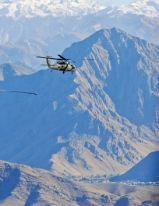Commentary from the South Asia Center on the most relevant news from the region, and suggested “must-read” analyses from the week.
Pakistan
On Tuesday, December 3, the United States military halted ground shipments routed through Pakistan from Afghanistan, citing safety concerns due to ongoing protests by Pakistanis against US drone strikes in Pakistan. These protests are led by Imran Khan and the Tehreek-i-Insaaf Pakistan (PTI), whose campaign platform included ending US drone strikes. The PTI is the dominant party in Khyber Pakhtunkhwa, which borders Afghanistan and the tribal area in which most of the drone strikes take place. Despite the protests, Pakistan’s Ministry of Foreign Affairs has stated it has and will continue to allow supplies to be transported through Pakistan. The ground shipments are US military equipment that is being removed from Afghanistan as part of the drawdown of US and allied forces in the country. The route through Pakistan has been critical throughout the war in Afghanistan, as it is used for the vast majority of ground transport into landlocked Afghanistan.
Relevant News Stories:
Pakistan’s Most Powerful Man? (Al Jazeera)
US Stops Cargo Shipments on Afghanistan-Pakistan land route, citing fears about protests (NBC)
Passage of Supplies Facilitates NATO Drawdown from Afghanistan: FO (ET)
Spiraling violence claims at least 14 in Karachi (ET)
India
This past week India held state assembly elections in Delhi and Rajasthan. These elections, only a few months before the Prime Minister’s election next spring, are considered to set the stage for the upcoming campaign. Delhi and Rajasthan both saw unusually high turnouts, with nearly sixty-six percent voter turnout in Delhi, and over seventy percent in Rajasthan. While the two main parties in contention are the ruling Congress Party and the center-right Bharatiya Janata Party (BJP), the Aam Aadmi (Common Man) Party has emerged as a potential spoiler. There are also numerous regional and local parties. The voting process was largely peaceful, with only a few incidents reported. Election results are set to be announced on December 8.
Relevant News Stories:
India’s New African Horizon’s: An American Perspective (Africa Review)
Delhi Elections: Millions vote in crucial state polls (BBC)
Delhi Votes in key assembly elections (Al Jazeera)
India Does Badly Again on Corruption Index (WSJ)
Bangladesh
The political impasse between the Awami League and the Bangladesh Nationalist Party (BNP) has continued to worsen, despite talks between the leaders of the two parties. Sheikh Hasina, current prime minister and head of the Awami League, and Ms. Khaleda Zia, former prime minister and head of the BNP, spoke for the first time in years to attempt to overcome the current impasse. While Bangladesh’s democracy was already fragile, the situation worsened when Hasina announced that she will not resign and allow a caretaker government to oversee the elections. The BNP responded by stating it will boycott the elections if there is no caretaker government in place. Caretaker governments are often used for a few months around national elections to ensure that those elections are free and fair. Hasina’s refusal is seen by her opponents as threatening the validity of the upcoming elections. Over two dozen people have been killed in political violence since November 26, when the official election date was announced.
Relevant News Stories:
Transcript of the Hasina-Khaleda Conversation (Dhaka Tribune)
Two Leader’s Enmity Stokes Concern over Vote in Fragile Democracy (NYT)
Political Violence, Boycotts Imperil Bangladesh Election (WSJ)
Afghanistan
Despite the Loya Jirga’s overwhelming approval of the Bilateral Security Agreement (BSA) between Afghanistan and the United States, Afghan Prime Minister Hamid Karzai has declared that he will not sign until after the presidential elections in 2014. Karzai indicated initially that he would wait for a recommendation from the Loya Jirga, an unofficial but influential gathering of tribal leaders, to sign the agreement. Many Afghan officials have been publically critical of Karzai’s stance, although the Afghan Taliban and the Hezb-i-Islami have both supported Karzai’s actions. NATO cannot finalize its agreement with Afghanistan until the US-Afghanistan agreement is signed. The longer this process drags on, the zero-option becomes increasingly likely, not only from the US, but also from all NATO countries. This may also adversely affect financial aid from Europe to Afghanistan.
Relevant News Stories:
NATO Cites Urgency in Reaching Pact between US and Afghanistan (NYT)
Failure to Sign Pact Could End Afghan Mission (Al Jazeera)
Iran
Samiyeh Balochzehi, the first female Baloch mayor in Iran, , was elected this week in the southern Iranian city Kalat. Electing a female mayor is rare, but not unheard of in Iran. However, Ms. Balochzehi’s election is unprecedented, as she is also a member of two minorities, the Baloch, an ethnic minority, and the Sunnis, who are a religious minority in Iran. Kalat is located in the province of Sistan-Balochistan, an underdeveloped and conservative province. Ms. Balochzehi’s election may usher in greater women’s rights in the area, and help break some of the political and societal boundaries that discriminate against women.
Relevant News Stories:
Baloch Sunni Woman elected mayor is a first for Iran (Al-Monitor)
Iran Deal Won’t be a Repeat of North Korea (VOA)
Iran Takes Charm Offensive to the Persian Gulf (NYT)
